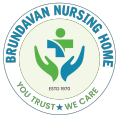Bowel Obstruction

Bowel obstruction is a serious medical condition characterized by a partial or complete blockage of the intestines, which prevents the normal passage of food, fluid, and gas through the digestive tract. At Brundavan Nursing Home, we recognize the urgency of diagnosing and treating bowel obstruction promptly to prevent complications such as bowel perforation, ischemia (lack of blood flow), and sepsis. Our approach to bowel obstruction involves rapid assessment, supportive care, and surgical intervention when necessary to ensure the best possible outcomes for our patients.
Clinical Evaluation: We prioritize early clinical evaluation and diagnosis of bowel obstruction in patients presenting with symptoms such as abdominal pain, bloating, distention, nausea, vomiting (often projectile), constipation, inability to pass gas, and abdominal tenderness. Our healthcare providers conduct a thorough medical history review, physical examination, and diagnostic tests such as abdominal X-rays, CT scans, or ultrasound to confirm the diagnosis of bowel obstruction and assess for signs of complications.
Fluid and Electrolyte Management: Bowel obstruction can lead to dehydration, electrolyte imbalances, and metabolic disturbances due to vomiting, diarrhea, and reduced oral intake. We provide aggressive fluid resuscitation and electrolyte replacement therapy as needed to restore normal fluid balance, maintain hemodynamic stability, and support organ function during the acute phase of treatment.
Nasogastric Tube Decompression: In cases of high-grade or complete bowel obstruction, we may insert a nasogastric tube to decompress the stomach and relieve distention, nausea, and vomiting. Nasogastric decompression can help reduce intraluminal pressure, alleviate symptoms, and prevent complications such as aspiration pneumonia.
Non-Surgical Management: In some cases of partial bowel obstruction or adynamic ileus (non-mechanical obstruction), we may initially attempt non-surgical management with bowel rest, intravenous fluids, electrolyte replacement, and prokinetic medications to stimulate intestinal motility. We closely monitor patients’ clinical status and response to conservative treatment, considering surgical intervention if symptoms worsen or fail to improve.
Surgical Intervention: For patients with complete or high-grade bowel obstruction, ischemia, perforation, or signs of peritonitis, surgical intervention is often necessary to relieve the obstruction, remove any necrotic or damaged bowel tissue, and restore bowel continuity. We offer prompt surgical exploration, typically performed using open surgery or laparoscopic techniques, depending on the patient’s clinical presentation, surgical history, and surgeon’s preference.
Bowel Resection and Anastomosis: During surgical intervention for bowel obstruction, we may perform bowel resection (removal of the affected segment of bowel) followed by anastomosis (reconnection of the remaining healthy bowel segments) to restore intestinal continuity and function. We ensure meticulous surgical technique, adequate blood supply to the anastomosis, and intraoperative assessment of bowel viability to minimize the risk of complications such as anastomotic leak or stricture.
Postoperative Care and Monitoring: After surgical treatment for bowel obstruction, we provide comprehensive postoperative care and monitoring to assess the patient’s recovery, monitor for signs of complications such as infection, bleeding, or anastomotic leak, and facilitate early mobilization and ambulation. We closely monitor vital signs, laboratory parameters, bowel function, and wound healing, adjusting treatment as needed to optimize outcomes and prevent recurrence.
Nutritional Support: Adequate nutrition is essential for healing and recovery in patients with bowel obstruction. We provide enteral or parenteral nutrition support as needed to meet the patient’s nutritional requirements and promote wound healing, particularly in cases where oral intake is limited due to surgery or gastrointestinal dysfunction.
Long-term Management: Following recovery from bowel obstruction, we offer long-term management and follow-up care to address underlying risk factors such as adhesions, tumors, strictures, or inflammatory bowel disease. We provide patient education on lifestyle modifications, dietary changes, medication adherence, and preventive measures to reduce the risk of recurrent bowel obstruction and complications.
At Brundavan Nursing Home, we are committed to providing timely, compassionate, and evidence-based care for patients with bowel obstruction. Our multidisciplinary team of surgeons, anesthesiologists, critical care specialists, nurses, and support staff work collaboratively to deliver safe, effective, and personalized care, ensuring that patients receive the highest standards of treatment and support throughout their recovery journey.
